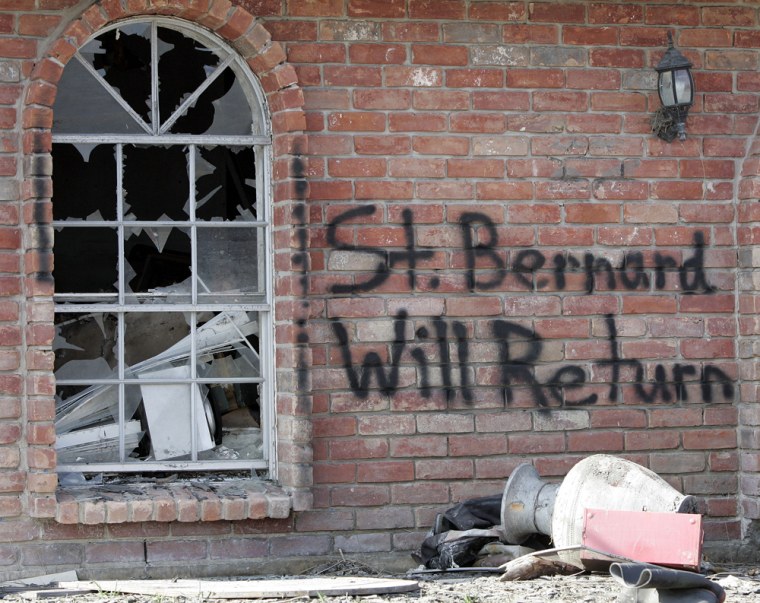Nearly three years after Hurricane Katrina, shifting demographics and the loss of community touchstones have rendered tight-knit St. Bernard Parish almost unrecognizable to those who cherished life here before the storm.
By one estimate, less than half the 67,000 pre-storm population is back in this New Orleans suburb, and residents are now poorer and more reliant on services from the cash-strapped parish government, St. Bernard President Craig Taffaro said.
There is no hospital, shopping options are limited, and teachers are in short supply. Many returnees cling to the life they once knew at remnant neighborhood hangouts.
Broken streets, concrete slabs where houses stood and abandoned strip malls are still visible. Less obvious is the emotional toll on a community ripped apart by Katrina.
Taffaro believes the clock is ticking on St. Bernard's future. His priorities: speeding up the pace of rebuilding homes, schools and other infrastructure, and taking the politically risky step of proposing a smaller habitation footprint.
"I want St. Bernard to be the hardworking, determined community it always was," he said.
Isolated in the Mississippi River delta between the Gulf of Mexico and New Orleans, St. Bernard always seemed a world to itself. Its residents liked it that way.
Canary Islanders who settled fishing communities in the 1700s, white flight to the suburbs of New Orleans in the 1950s and '60s and deep-rooted black communities created a blue-collar independence set amid oil refineries, alligator-infested swamps and the site of the Battle of New Orleans.
Generations of families lived within blocks of each other. They had what they needed — shopping, ball games on Friday nights, friends and crawfish boils.
Things have changed
Since Katrina, things have changed.
Henry Rodriguez Jr., longtime parish leader defeated by Taffaro last fall, remembers when he could walk into a store and know almost everyone in it.
"That's not true today," he said as he drove his pickup along streets so warped and broken that doing the speed limit can be risky.
Some residents, black and white, complain about Hispanic workers in the area now, many talk about crime, and it's hard to find anyone who says rebuilding hasn't been agonizingly slow.
"This whole entire thing is a joke," said George Tustin, who left Indiana to settle in Meraux because of St. Bernard's reputation as a good place for families.
At least $1 billion in federally funded infrastructure repair is being done. Taffaro said parish leaders have made strides in penetrating the recovery bureaucracy to get work moving on sewerage, fire stations, schools and post offices.
But the task is enormous. On Aug. 29, 2005, flooding from Katrina came from almost every direction. A survey showed virtually every building in St. Bernard was damaged. As in neighboring New Orleans, trucks rumbled through neighborhoods for weeks removing debris, and cultural and government chaos followed.
One of the biggest challenges, as in other areas lashed by Katrina across the Gulf Coast, is housing.
Red X's brand thousands of houses that parish leaders want demolished. The state plans to transfer to local control thousands more bought from homeowners who didn't want to return. Some might be renovated and attract new residents. Others may be torn down. Taffaro said he envisions neighborhoods with more green space and homesites with larger yards.
Few expect St. Bernard to reach its pre-storm population soon. A major obstacle is the lack of a hospital, though efforts are under way to build one. Parish estimates put the population at 32,000. Chief administrative officer Dave Peralta says he'd be happy to have 45,000 by 2013.
"Will we have as many schools? No. But certainly things will be a lot better and more progressive," he said.
Optimism, hope prevail
Jeff Pohlmann hopes so. He's been doing a one-hour commute from north of Lake Pontchartrain to St. Bernard to work in his restaurant, Today's Ketch Seafood. "I hate the commute," said Pohlmann, who used to live nearby and worries about the next hurricane despite government assurances that levees are secure.
Pohlmann puts up with the drive because he feels a deep connection to Chalmette.
There are signs the St. Bernard he remembers is there. Some neighborhoods are ghostly quiet at night, but in others children play pick-up games in their driveways. Store clerks presenting your bill still tack "baby" onto their thank you in an unmistakable St. Bernard drawl. Softball leagues are back, and schools are re-establishing community hubs.
Still, Taffaro fears more serious day-to-day struggles could be overwhelming. He knows moving forward will take digging deep into St. Bernard's emotional reserve, and getting over a sense of being forgotten.
Just up the road from St. Bernard is New Orleans' Lower 9th Ward, where presidential candidates, volunteers, TV home repair shows and celebrities such as actor Brad Pitt have heaped attention. Such concern, St. Bernardians say, seems to stop at the parish line.
So they take out their frustrations by singing karaoke or shooting darts at hangouts like the Dog House, one of 15 bars, casinos and grills the local tourism bureau lists as nightlife. Others replant roots at the festivals that are quintessential St. Bernard.
A spring crawfish festival drew families and friends, many out of touch since Katrina.
Anthony Mendoza said he doesn't regret returning. He has a new neighbor, his only one, a woman from Florida. He's running on faith now.
"This is home," he said.
